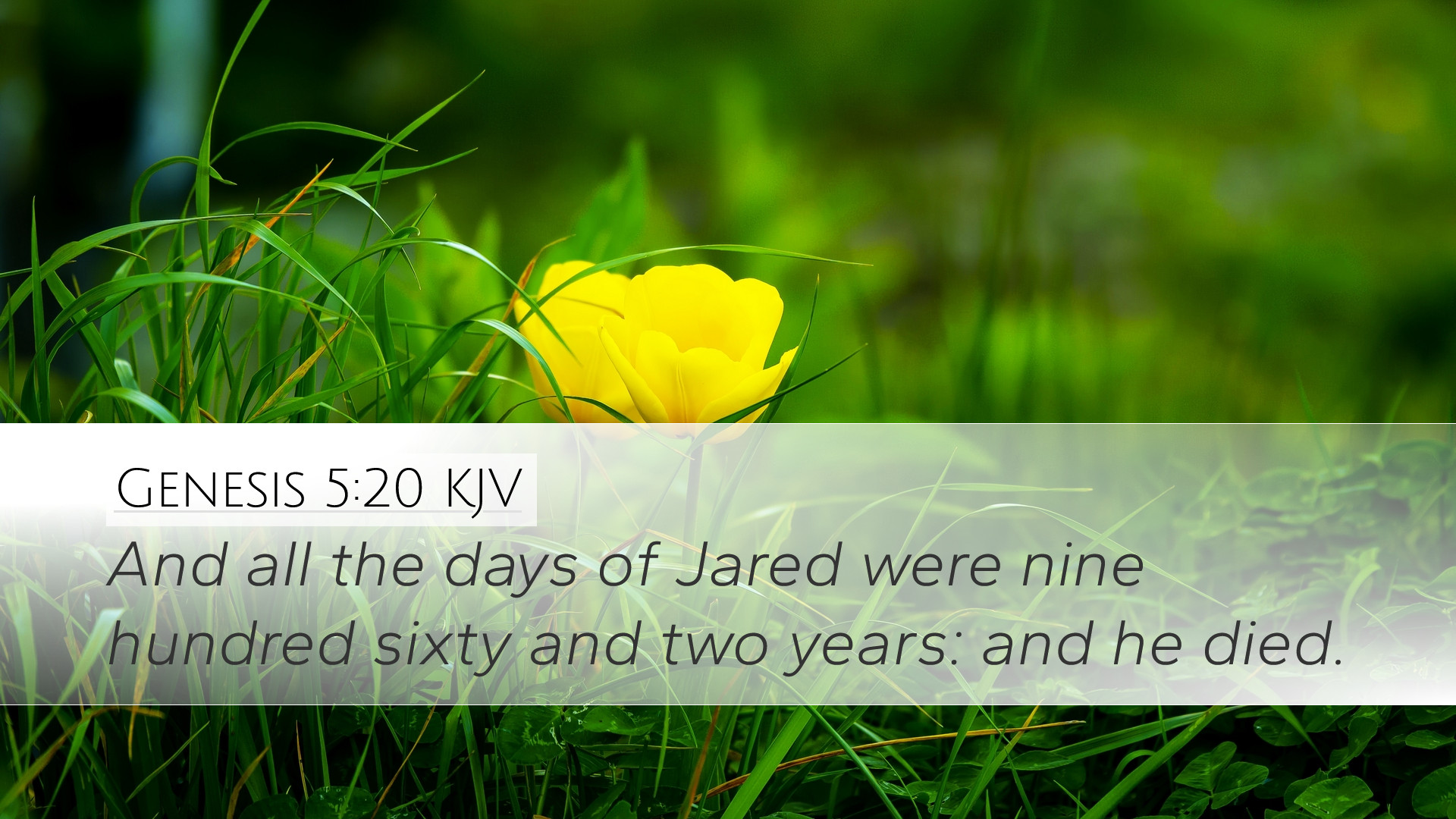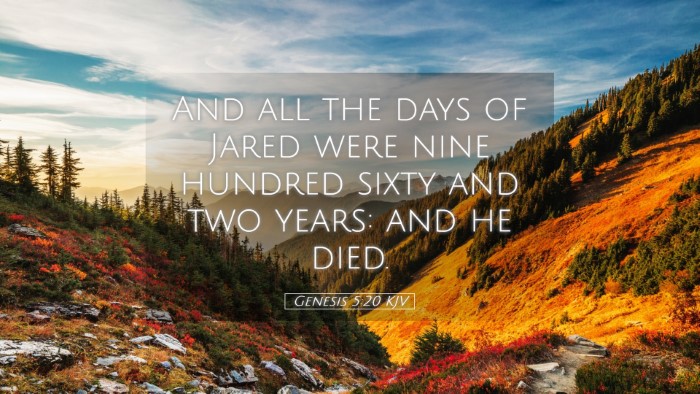Commentary on Genesis 5:20
Verse: “And all the days of Jared were nine hundred sixty and two years: and he died.”
Introduction
This verse concludes the account of Jared, a significant figure within the genealogy leading to Noah. Jared's long life signifies not only the chronological timeline of early humanity but also serves as a reflection of the spiritual heritage passed down through generations. The commentaries of Matthew Henry, Adam Clarke, and Albert Barnes provide valuable insights into the implications of Jared's life and death.
Historical Context
The genealogies presented in Genesis are paramount for understanding the context of human history and the unfolding of God's covenant. Jared, meaning "descent," is part of a lineage that connects Adam to Noah, emphasizing the continuity of God's plan.
Matthew Henry’s Insights
Matthew Henry emphasizes the spiritual aspect of each patriarch in Genesis. He notes that Jared represents a link in the faithful lineage leading to Noah and underscores the idea that the long lives of these early figures signify God's patience and grace towards humanity.
Henry articulates that the mention of Jared's entire lifespan serves to remind believers of the brevity of life compared to eternity. He reflects on how the lengthy lives of these patriarchs were both a blessing and a reminder of human frailty and the impending judgment symbolized in the coming flood.
Albert Barnes’ Commentary
Albert Barnes notes that the specific mention of Jared's age, 962 years, is significant in the genealogy. Barnes suggests that such longevity points to an original created order where humanity was closer to the divine purpose before the fall. He incorporates reflections on the implications of such ages indicating the gradual decline of humanity post-Eden.
Furthermore, Barnes discusses the impact of Jared's lineage on the people of faith. His connection to Enoch—the one who ‘walked with God’—demonstrates the importance of familial faith and its transmission down generations. The deaths of the patriarchs serve as a reminder of mortality and the need for righteous living in anticipation of God's promises.
Adam Clarke’s Analysis
Adam Clarke offers a deeper exploration of the name "Jared," associating it with the theme of descent or bringing forth. He highlights the notion that Jared's life, though reaching a great age, ultimately culminates in death, teaching that life on earth, regardless of duration, leads to the same end: the grave.
Clarke provides a theological perspective, suggesting that the extended lifespan of Jared implies God’s grace in allowing more opportunities for humanity to turn back to Him. He encourages readers to reflect upon their lives, asking the rhetorical question of what legacy they will leave behind.
Theological Implications
Genesis 5:20 serves as a testament to God’s sovereignty over life and death. The repetition of the phrase “and he died” throughout the genealogies serves as a somber reminder of human mortality. It evokes a sense of urgency for faith and righteousness in light of the ultimate fate awaiting all humans.
Moral Lessons for Today
- The Value of Righteous Living: The lives of the patriarchs, like Jared, showcase the importance of living with integrity and in harmony with God’s will.
- The Legacy of Faith: The importance of religious heritage and how faith can be passed down from one generation to another.
- The Reality of Mortality: Acknowledging life’s brevity prompts believers to prioritize their spiritual growth and relationship with God.
- Hope in God’s Plan: Even amidst death, there exists a hope in the resurrection and eternal life for those who believe in God’s promises.
Conclusion
Genesis 5:20 encapsulates a pivotal moment in the biblical narrative, marking the life and passing of Jared within the genealogy from Adam to Noah. Through the insights of various commentaries, we glean significant truths regarding life, faithfulness, and the inevitability of death.
For pastors, students, theologians, and scholars, the verse serves not only as a historical account but as a profound reflection on the journey of faith that spans generations. It invites contemplation on how we might emulate the faithfulness of Jared and his descendants, remaining steadfast in our walk with God until our appointed time.


